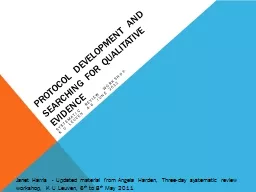PPT-Hermeneutics and Qualitative Research
Author : test | Published Date : 2018-02-10
Transpersonal Research Colloquium TRC 2016 United Kingdom Professor Emerita Rosemarie Anderson PhD Sofia University Palo Alto CA USA rosemarieandersonsofiaedu wwwrosemarieandersoncom
Presentation Embed Code
Download Presentation
Download Presentation The PPT/PDF document "Hermeneutics and Qualitative Research" is the property of its rightful owner. Permission is granted to download and print the materials on this website for personal, non-commercial use only, and to display it on your personal computer provided you do not modify the materials and that you retain all copyright notices contained in the materials. By downloading content from our website, you accept the terms of this agreement.
Hermeneutics and Qualitative Research: Transcript
Download Rules Of Document
"Hermeneutics and Qualitative Research"The content belongs to its owner. You may download and print it for personal use, without modification, and keep all copyright notices. By downloading, you agree to these terms.
Related Documents














